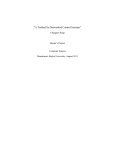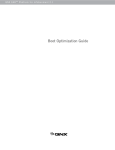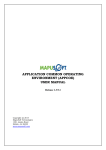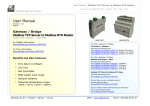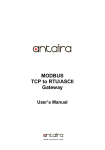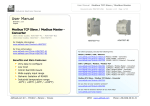Download lib-modbus - IBV - Echtzeit- und Embedded GmbH & Co. KG
Transcript
IBV - ECHTZEIT- UND EMBEDDED GMBH & CO. KG
Realtime is BLUE
lib-modbus
MODBUS/TCP Client- and Server-Library
Programmers Manual
IBV-MODBUS-0001
Issue 1.0
06.03.2008
Author
Reviewed
Released
_________________
_________________
_________________
Dominic Rath
Lutz Vollbracht
Lutz Vollbracht
LIB-MODBUS - PROGRAMMERS MANUAL.DOC
Seite 1 von 11
IBV - ECHTZEIT- UND EMBEDDED GMBH & CO. KG
Change Log
Issue
Date
Chapter Description
Author
1.0
06-Mar-2008
All
Dominic Rath
LIB-MODBUS - PROGRAMMERS MANUAL.DOC
First Issue
Seite 2 von 11
IBV - ECHTZEIT- UND EMBEDDED GMBH & CO. KG
Table of Contents
1. About this Document .................................................................................................. 4
1.1. Purpose .................................................................................................................................................4
1.2. Terminology...........................................................................................................................................4
1.3. Acronyms...............................................................................................................................................4
1.4. References ............................................................................................................................................4
2. Installation.................................................................................................................... 5
2.1. Preconditions.........................................................................................................................................5
2.2. Installation Procedure............................................................................................................................5
3. Library Description...................................................................................................... 6
3.1. Header Files ..........................................................................................................................................6
3.2. Library Initialization................................................................................................................................6
3.3. Server Interface .....................................................................................................................................7
3.3.1.
Backend Interface ....................................................................................................................... 7
3.4. Client Interface ......................................................................................................................................9
3.4.1.
Bit Access Functions................................................................................................................. 10
3.4.2.
Register Access Functions ....................................................................................................... 10
3.4.3.
Miscellaneous Functions........................................................................................................... 11
LIB-MODBUS - PROGRAMMERS MANUAL.DOC
Seite 3 von 11
IBV - ECHTZEIT- UND EMBEDDED GMBH & CO. KG
1. About this Document
1.1. Purpose
This document functions as manual for the software module
"lib-modbus" - Release 1.0.
The intended readership is:
¨
Project Manager for review and release
¨
Software Engineer as input for the implementation and maintenance phase
¨
Software Engineer as input for the design and implementation of other modules
¨
Technical personnel as Installation Manual
¨
End User as User s Manual
This document is compliant with the IBV documentation standards.
Familiarity with the C programming language, the QNX Momentics development environment, and the
MODBUS protocol and data model is assumed.
1.2. Terminology
MODBUS
Modbus is a communications protocol existing in multiple variants for communication over serial lines
(MODBUS/ASCII and MODBUS/RTU) and over TCP/IP networks (MODBUS/TCP).
1.3. Acronyms
IBV
IBV - Echtzeit- und Embedded GmbH & Co. KG
TCP
Transmission Control Protocol
RTU
Remote Terminal Unit
1.4. References
[MBAP]
MODBUS APPLICATION PROTOCOL SPECIFICATION V1.1b
[MBTCPIP] MODBUS MESSAGING ON TCP/IP IMPLEMENTATION GUIDE V1.0b
[MBSER]
MODBUS over Serial Line Specification and Implementation Guide V1.02
LIB-MODBUS - PROGRAMMERS MANUAL.DOC
Seite 4 von 11
IBV - ECHTZEIT- UND EMBEDDED GMBH & CO. KG
2. Installation
The software is released for
¨
Operating System QNX 6.3.0 with Service Pack 3
2.1. Preconditions
¨
QNX 6 running on the target platform.
¨
Ethernet link to the target platform.
2.2. Installation Procedure
Copy the file "liblib-modbus.so" to the desired target directory (usually "/lib"), renaming it to
"liblib-modbus.so.1".
The header files from the "common/" subdirectory have to be made available to the user application, either
by copying them to a system wide location or by adding the directory to the include paths searched by the
compiler.
The library files "liblib-modbus.so" and "liblib-modbus_g.so" (debug variant) from the
"binaries/" subdirectory have to made available to the user application, either by copying them to a
system wide location or by adding the directory to the library paths searched by the linker.
LIB-MODBUS - PROGRAMMERS MANUAL.DOC
Seite 5 von 11
IBV - ECHTZEIT- UND EMBEDDED GMBH & CO. KG
3. Library Description
3.1. Header Files
The following headers have to be included by a user application:
¨
modbus-common.h
Defines and declarations used by client and server
¨
modbus-client.h
Application interface to client functionality
¨
modbus-server.h
Application interface to server functionality
All necessary header files can be found in the "source/common/" subdirectory. A user application may
decide to include only one of "modbus-client.h" and "modbus-server.h", if client and server
functionality isn t required at the same time.
3.2. Library Initialization
Prior to calling any other library function, the libraries initialization function should be called:
int modbus_init();
The function takes no arguments and returns MODBUS_ERR_OK on success.
LIB-MODBUS - PROGRAMMERS MANUAL.DOC
Seite 6 von 11
IBV - ECHTZEIT- UND EMBEDDED GMBH & CO. KG
3.3. Server Interface
The server interface consists of two functions:
struct __server *modbus_start_server(int type, void *server_params,
_backend_interface *backend);
int modbus_stop_server(struct __server *server);
To start a server, the user application has to call modbus_start_server(), specifying the connection type
(only MODBUS_CONNECTION_TCP is implemented), a set of parameters specific to the connection type, and
the backend interface used by the library to retrieve data for client requests.
The parameter set for TCP connections is a pointer to a structure of type _modbus_tcp_params as
declared in modbus-common.h. It consists of a pointer to a C-String specifying the IP address the server
should bind itself to, and a short integer specifying the TCP port the connection should listen at. The IP
address pointer may be NULL, in which case the server will listen on all addresses assigned to the system.
typedef struct __modbus_tcp_params
{
char *ip;
short port;
} _tcp_params;
The modbus_start_server() function returns a pointer to the newly created server on success, or NULL
in case of an error.
3.3.1. Backend Interface
The backend interface is declared in modbus-server.h. The callback functions supplied in the
_backend_interface structure have to be implemented by the user application. They will be called by the
server to retrieve data for client requests.
typedef struct __backend_interface
{
int (*read_coils)(uint16_t start_ref, uint8_t *bit_array,
uint16_t ref_count);
int (*write_coils)(uint16_t start_ref, uint8_t *bit_array,
uint16_t ref_count);
int (*read_input_discretes)(uint16_t start_ref, uint8_t *bit_array,
uint16_t ref_count);
int (*read_input_registers)(uint16_t start_ref, uint16_t *reg_array,
uint16_t ref_count);
int (*read_holding_registers)(uint16_t start_ref, uint16_t *reg_array,
uint16_t ref_count);
int (*write_holding_registers)(uint16_t start_ref, uint16_t *reg_array,
uint16_t ref_count);
int (*read_exception_status)(uint8_t *exception_status);
LIB-MODBUS - PROGRAMMERS MANUAL.DOC
Seite 7 von 11
IBV - ECHTZEIT- UND EMBEDDED GMBH & CO. KG
int (*process_pdu)(uint8_t *request, uint8_t request_length,
uint8_t **reply, uint8_t *reply_length);
int (*lock)();
int (*unlock)();
} _backend_interface;
The backend interface functions closely follow the MODBUS data model according to [MBAP]. References
and reference counts are expressed as integer numbers between 0 and 65535 (zero based).
Functions accessing coils or input discretes use arrays of uint8_t where each array element corresponds
to one coil or input discrete.
Functions operating on input or holdings registers use arrays of uint16_t, where each array element
corresponds to one input or holding register.
Functions for reading data (read_coils(), read_input_discretes() and
read_input_registers()) are supposed to fill the array elements with the appropriate application
specific values. The first array element (index [0]) corresponds to the reference supplied as start_ref.
The last array element (index [ref_count]) corresponds to reference start_ref + ref_count
1.
Functions for writing data (write_coils(), write_input_discretes and
write_input_registers) are supposed to use the values from the array elements to write application
specific data.
The user application should return MODBUS_ERR_ILLEGAL_DATA_ADDRESS if addresses outside of the
application specific data model are requested. If no errors occurred while processing the backend callback
function, MODBUS_ERR_OK has to be returned to cause lib-modbus to send a positive reply.
When read_exception_status() gets called, the current status of the exception register (8 bit) should
be returned to the MODBUS server library using the uint8_t *exception_status pointer.
The function process_pdu() will be called for all MODBUS function codes not handled by the server
library. This allows the user application to handle additional application-specific function codes. In case the
application doesn t want to handle a certain function code it should return
MODBUS_ERR_ILLEGAL_FUNCTION.
The request and request_length arguments hold the MODBUS PDU as received by the server, while
reply and reply_length are pointers to the location where the user application should store any results
produced. The memory for the reply buffer has to be allocated by the user application. It will be freed by the
server library once the reply has been sent. The length of the reply buffer has to be returned using the
reply_length pointer.
The lock() and unlock() functions are called to ensure data consistency for the Read/Write Multiple
Registers and Mask Write Register function codes. It is up to the user application to ensure that the data is
held consistent between a lock() and a subsequent unlock() call.
In order to stop a previously started MODBUS server, the user application has to call the
modbus_stop_server() function using the server pointer returned by the modbus_start_server()
function as an argument. The pointer will be invalid once the modbus_stop_server() function returned.
LIB-MODBUS - PROGRAMMERS MANUAL.DOC
Seite 8 von 11
IBV - ECHTZEIT- UND EMBEDDED GMBH & CO. KG
3.4. Client Interface
Two functions exist that allow the user application to open and close connections to clients. In case of a
MODBUS/TCP connection, an individual connection has to be opened for every client that should be
accessed. If MODBUS/RTU support was to be implemented, a single connection could be used to access
multiple clients.
struct __client_connection *modbus_open(int type, void *connection_params,
int timeout);
int modbus_close(struct __client_connection *connection);
The parameters required by the modbus_open() function are the same as those required by the
modbus_start_server() function, see 3.3 Server Interface for more information. The additional
timeout argument specifies the timeout for client requests in milliseconds. The function will return a poiner
to the newly created client connection on success, or NULL in case an error occurred. The returned pointer
has to be used in all subsequent calls as a handle to identify the particular connection.
A connection should be closed using the modbus_close() function if the client connection isn t required
anymore. The connection pointer is invalid once the modbus_close() function returned, and must not be
used in subsequent calls to client request functions.
All functions for sending MODBUS requests to a MODBUS server take a pointer to the connection and a
slave ID as an argument. For MODBUS/TCP requests, the slave parameter is ignored, and the
corresponding field in the request is filled with 0xFF.
Possible return values from client request functions are
¨
MODBUS_ERR_OK
¨
MODBUS_ERR_CONNECTION_CLOSED
¨
MODBUS_ERR_COMMUNICATION_FAILURE
¨
One of the MODBUS protocol error codes
In case of a connection or communication error the corresponding client connection should be closed and
reopened. No automatic retransmission is performed.
LIB-MODBUS - PROGRAMMERS MANUAL.DOC
Seite 9 von 11
IBV - ECHTZEIT- UND EMBEDDED GMBH & CO. KG
3.4.1. Bit Access Functions
The following functions may be called by the user application to send MODBUS requests accessing bit
quantities:
int modbus_read_coils(struct __client_connection *connection, uint8_t
slave, uint16_t start_ref, uint8_t *bit_array, uint16_t ref_count);
int modbus_read_input_discretes(struct __client_connection *connection,
uint8_t slave, uint16_t start_ref, uint8_t *bit_array, uint16_t
ref_count);
int modbus_write_coil(struct __client_connection *connection, uint8_t
slave, uint16_t bit_ref, uint8_t bit_value);
int modbus_write_multiple_coils(struct __client_connection *connection,
uint8_t slave, uint16_t start_ref, uint8_t *bit_array, uint16_t
ref_count);
Arrays of uint8_t are used to transfer data from the user application to the MODBUS library. Each coil or
input discrete corresponds to one array element, with index 0 referencing the item specified by the
start_ref parameter. The modbus_write_coil() function operates on a single coil, whose value is
supplied as a single uint8_t argument.
3.4.2. Register Access Functions
The following functions may be called by the user application to send MODBUS requests accessing
registers:
int modbus_read_multiple_registers(struct __client_connection *connection,
int8_t slave, uint16_t start_ref, uint16_t *reg_array, uint16_t
ref_count);
int modbus_read_input_registers(struct __client_connection *connection,
uint8_t slave, uint16_t start_ref, uint16_t *reg_array, uint16_t
ref_count);
int modbus_write_single_register(struct __client_connection*, uint8_t
slave, uint16_t reg_ref, uint16_t reg_value);
int modbus_write_multiple_registers(struct __client_connection
*connection, uint8_t slave, uint16_t start_ref, uint16_t *reg_array,
uint16_t ref_count);
int modbus_mask_write_register(struct __client_connection *connection,
uint8_t slave, uint16_t reg_ref, uint16_t and_mask, uint16_t or_mask);
LIB-MODBUS - PROGRAMMERS MANUAL.DOC
Seite 10 von 11
IBV - ECHTZEIT- UND EMBEDDED GMBH & CO. KG
int modbus_read_write_registers(struct __client_connection *connection,
uint8_t slave, uint16_t read_ref, uint16_t *read_array, uint16_t
read_count, uint16_t write_ref, uint16_t *write_array, uint16_t
write_count);
Arrays of uint16_t are used to transfer data from the user application to the MODBUS library. Each input
register or holding register corresponds to one array element, with index 0 referencing the item specified by
the start_ref parameter.
The modbus_write_single_register() function operates on a single holding register, whose value is
supplied as a single uint16_t argument.
The modbus_mask_write_register() function operates on a single holding register, too, but takes an
and_mask and an or_mask as specified by the MODBUS standard.
The modbus_read_write_registers() function uses two arrays, one to hold the values that should be
written, and one holding the values read from the server. Two different count parameters exist to allow
reading and writing arbitrary numbers of registers.
3.4.3. Miscellaneous Functions
int modbus_read_exception_status(struct __client_connection *connection,
uint8_t slave, uint8_t *status);
The modbus_read_exception_status() function allows a client to read a servers exception status
register. The exception register value is returned using the uint8_t Pointer status.
int modbus_send_pdu(struct __client_connection *connection, uint8_t slave,
uint8_t *request, uint8_t request_length, uint8_t **reply, uint8_t
*reply_length);
The modbus_read_exception_status() function provides direct access to the MODBUS PDU interface
implemented by lib-modbus. The request is transmitted as is, and any data received is returned using the
reply and reply_length pointers. The buffer space for the reply is allocated by the library, and has to be
freed by the user application once the reply has been processed. In case of an error (either communication
or protocol error), no reply is returned, and the pointers are set to NULL.
LIB-MODBUS - PROGRAMMERS MANUAL.DOC
Seite 11 von 11












